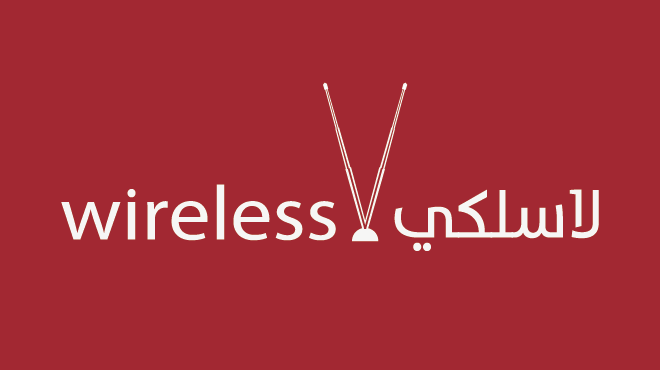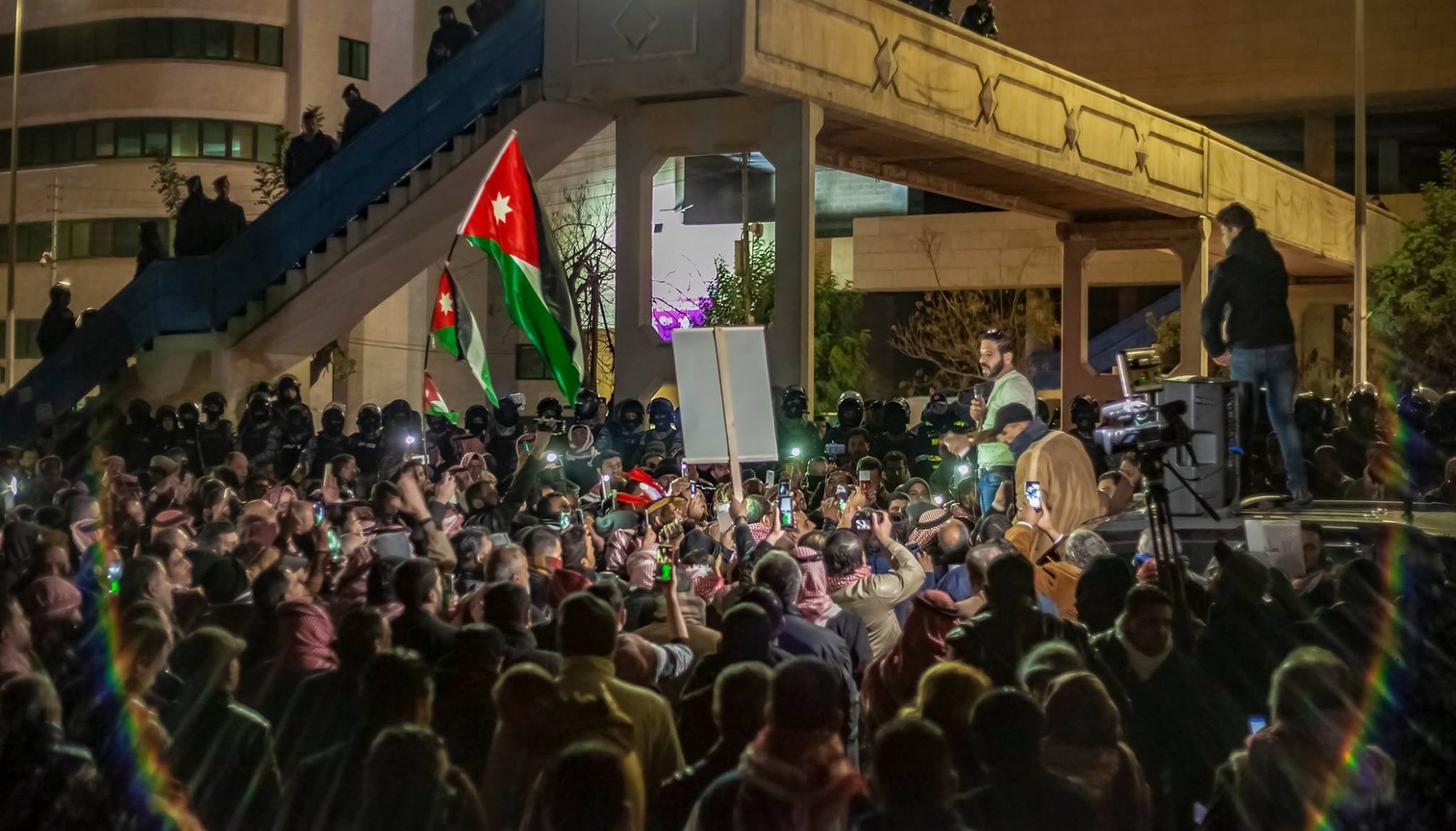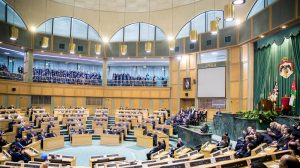English text below
أدى الانتشار السريع للإنترنت في السنوات الأخيرة إلى تدفق سيل هائل من المعلومات عبر الفضاء الالكتروني، إلى درجة جعلت المستخدمين الأفراد وحتى المؤسسات يجدون صعوبة كبيرة في متابعة كل هذا الكم من المحتوى والمعلومات. كما أن وسائل الإعلام المختلفة لم تستطع حتى الآن أن تجد طريقة مبتكرة وعملية تمكن الصحفيين والنشطاء من التواصل بفعالية مع هذا الفائض من المعلومات.
يشترك الأردن مع دول المنطقة باعتباره يشهد أحد أسرع معدلات إنتشار الإنترنت على مستوى العالم، فيمكن القول أن حوالي ٥٦ بالمئة من سكان الأردن (حوالي ستة ملايين) “مشبوكين” على الإنترنت ولديهم القدرة على الوصول للمحتوى الرقمي، مقابل ١١ بالمئة في عام ٢٠٠٠. تصاحب ازدياد أعداد مستخدمي الإنترنت في الأردن مع تكاثر سريع في أعداد “المواقع الإخبارية” التي غيرت خارطة المشهد الإعلامي الأردني. أصبحت هذه المواقع (التي زاد عددها عن ١٠٠ موقع) أو “وكالات الأنباء الالكترونية”، أصبحت مصدر الأخبار الأول للأردنيين نظراً لقدرتها على تزويد القارئ بالأخبار أولاً بأول وبشكل تعجز عنه وسائل الإعلام التقليدية، وظهر الجمهور المتزايد لهذه المواقع من خلال مشاركة المحتوى الذي تقدمه على شبكات التواصل الإجتماعي مثل فيسبوك وتويتر من معظم المستخدمين الأردنيين.
شكل بروز هذه المواقع إشكالية بالنسبة “لإعلام الدولة” أو الإعلام التقليدي الخاضع لسيطرة الدولة من زاويتين أساسيتين: الأولى، ظهور قطاع إعلامي كامل غير منظم وغير خاضع للقوانين، والثاني، تحول الإنترنت إلى بيئة خصبة للنقاش تمكن أي مواطن أردني عادي من مشاركة رأيه حول أي موضوع والتحاور حوله عبر مجموعات الفيسبوك أو تويتر أو المدونات أو من خلال تعليقاته على المواد التي تنشرها المواقع الإخبارية، فبدأت محاولات الحكومة للسيطرة على هذا المحتوى وإخضاعه لقوانين من وضعها. تستمر الحكومة الأردنية بمحاولات فرض القيود على المواقع الإخبارية رغم اعتراض ناشري هذه المواقع وغيرهم من الناشطين الإلكترونيين الذين يشعرون بقلق مبرر وخوف من أن تستخدم هذه القوانين المقيدة وتفسيراتها في التأثير على حرية الإنترنت بشكل عام.
لكن في المقابل، فإن غياب أي نوع من البحث العلمي حول الاتجاهات التي تحدد طبيعة الإعلام الرقمي والتحديات التي تواجهه شكل عائقاً كبيراً أمام هؤلاء النشطاء الرافضين للتهديدات التي تمس حرية الرأي والحرية الالكترونية، فكانت تلك هي الفرصة أمام حبر لسد هذه الثغرة من خلال دعوة الباحثين والصحفيين والناشطين للتعاون لتقديم المعلومات و”إنتاج المعرفة” حول كل ما يتعلق بالحجب، والأمان الإلكتروني، وحقوق الملكية الفكرية، وحرية الرأي، وقوانين الإعلام والمراقبة وانتهاك الخصوصية الإلكترونية. تسعى هذه المبادرة لتحليل المشهد الإعلامي الأردني المتغير، والبحث في الأثر الذي يتركه هذا التغيير في الإعلام على السياسات والتشريعات وبالمحصلة، على الأفراد.
أين نقف اليوم؟
تكررت محاولات الحكومة الأردنية للسيطرة على المحتوى الإلكتروني بمراقبته أو حجبه خلال السنوات الماضية، وذلك كردة فعل على ازدياد أعداد الموقع الإخبارية وعلى زيادة معدلات استخدام الأردنيين لشبكات التواصل الإجتماعي مثل فيسبوك وتويتر.
في عام ٢٠١٠ حاولت الحكومة حجب أكثر من ٥٠ موقع إخباري إلكتروني عن الأجهزة في المباني الحكومية، بحجة دراسة ادعت أن الموظفين الحكوميين يقضون ثلاث ساعات من يوم العمل في تصفح هذه المواقع. تصاحبت هذه السياسة مع تقديم مشروع قانون مثير للجدل بعنوان “قانون الجرائم الالكترونية” يستهدف المواقع الإخبارية من خلال مواد تفرض غرامات على وسائل الإعلام التي تنشر مواد تعتبر قدح أو ذم أو تشهير، ويسمح للسلطات بمداهمة مكاتب المواقع ومصادرة أجهزتها. تم إزالة هذه المواد من القانون بعد ضغوط من المدونين والصحفيين والناشطين، كما تم التراجع عن قرار الحجب في الدوار الحكومية.
لكن الحكومة الأردنية ما تزال تبحث عن طرق لتنظيم (أو تحديد أو كلاهما معاً) الإعلام الجديد والمحتوى الإلكتروني في البلاد، خاصةً مع التغييرات التي تشهدها الدول العربية مؤخراً، وقد كشفت التعديلات الأخيرة على قانون المطبوعات والنشر سيء الذكر عن نوايا الحكومة. فرضت التعديلات الجديدة على المواقع الالكترونية تسجيل الموقع في وزارة الصناعة والتجارة والحصول على ترخيص من دائرة المطبوعات والنشر تحت طائلة حجب الموقع لمن يتخلف عن ذلك، كما فرضت على الموقع تعيين رئيس تحرير يحمل عضوية نقابة الصحفيين لإكمال اجراءت التسجيل والترخيص. (يمكن الإطلاع على تفاصيل الإجراءات على موقع حبر). جعلت التعديلات المواقع الإلكترونية أيضاً مسؤولة بشكل مباشر عن التعليقات التي يتركها القراء على المواد المنشورة بما في ذلك المسؤولية القانونية عن أي تعليقات تعتبر “مسيئة”، كما فرضت حذف أي تعليق “ليس له علاقة بالمادة المنشورة”. أخيراً ألزمت التعديلات الموقع الإلكترونية بحفظ كل التعليقات ومعلومات المعلقين من القراء على كل المواد لفترة ستة أشهر، وحصلت التعديلات على موافقة مجلسي النواب والأعيان وأصبحت نافذة بعد توشيحها بالإرادة الملكية. أما مؤخراً فقد قامت الحكومة بالإعلان عن نيتها لإعداد قانون جديد للاتصالات يجبر الشركات التي تقدم خدمات الإنترنت على حجب الموقع الإباحية أو أي مواقع أخرى تؤثر سلباً على النسيج الأخلاقي للبلاد.
لا بد من أخذ دوافع الحكومة لتقييد الفضاء الإلكتروني في إطار أوسع لتفسير سبب الاختلاف المفاجئ في سياسات الدولة فيما يتعلق بالحريات الالكترونية، ومن الصعب أن يخرج هذا الإطار عن مخاوف الدولة من حالة عدم الرضا الواسع في المجتمع الأردني والتغييرات التي اصابت بلداناً عربية أخرى خلال ما يعرف بالربيع العربي. أظهر الأردنيون نشاطاً واضحاً في استخدام شبكات التواصل الاجتماعي لفتح النقاشات والتحشيد وتنظيم الفعاليات والمظاهرات، أو بالمحصلة استخدام الفيسبوك وتويتر لإظهار حالة عدم الرضا والامتعاض من الوضع القائم ورغبتهم بتغييره. يوجد اليوم أكثر من ٢٫٤ مليون مستخدم أردني للفيسبوك، بحسب موقع “سوشيال بيكرز”، منهم حوالي ٢٥٠ ألف مستخدم انضموا في الستة أشهر الماضية. أكثر الصفحات والمجموعات الأردنية نشاطاً اليوم على الفيسبوك هي ذات طبيعة سياسية، في إشارة واضحة إلى حدوث تغيير في طبيعة الموضوعات أو حتى طبيعة المستخدمين الأردنيين ذاتهم منذ بدء “الربيع العربي” حيث ظهر أن الأردنيين قد وجدوا “صوتاً سياسياً” جديداً، واختاروا أن يجعلوه مسموعاً عبر الإنترنت.
من المهم أيضاً دراسة أثر انتشار “التكنولوجيا المحمولة” في هذا المجال، فمعدل انتشار الأجهزة الخلوية في الأردن وصل إلى ١١٨ بالمئة، وأكثر من نصف هؤلاء المستخدمين يحملون “أجهزة ذكية” تجعلهم على إتصال دائم بالانترنت وبمواقع التواصل الإجتماعي، ومن الضروري البحث في أثر هذا الانتشار، وفي انتشار ثقافة “التطبيقات” في المنطقة كاملة وفي وصول الأجهزة الذكية ذات الأسعار المعقولة إلى أعداد متزايدة من المستخدمين.
ليست سياسات الحكومة وسياسات الحجب هي وحدها ما يؤثر على كيفية إستخدام الإنترنت وكيفية الوصول للمحتوى، بل هناك أيضاً العامل الاجتماعي، وحتى الآن لا يظهر أن المستخدم العادي أو حتى المجتمع المدني يعي آثار التغييرات التي تصيب الإنترنت، وأثر هذه التغييرات على “الحماية الكترونية” غيرها من قضايا الفضاء الالكتروني.
إلى أين ننطلق؟
وايرلس، هو محاولة حبر لدفع نقاش حول هذه القضايا وجمع وجهات النظر المختلفة. تشمل خطة العمل البحث وجمع المعلومات، ونشر مواد تتعلق بهذه القضايا على موقع المدونة، وتنظيم عدة جولات من النقاشات حول السياسات الالكترونية وحرية الإنترنت. سنبحث في القضايا الفنية للبنية التحتية للإنترنت في الأردن والمنطقة وسنحاول تصويرها وتبسيطها، كما سنبحث في الجوانب والآثار الاجتماعية لاستخدام الإنترنت والخدمات التي تقدمها. سنستطلع أيضاً مستوى وعي المستخدمين بقضايا الخصوصية والأمان عند استخدام الإنترنت، والخطوات التي يمكن أن يتخذوها لحماية أنفسهم.
انضموا إلينا في هذه الرحلة من البحث واستكشاف الأفكار. نحن نتطلع إلى بناء مجتمع متميز من الباحثين والصحفيين والنشطاء وغيرهم من الأشخاص الراغبين بمواجهة “التحديات الافتراضية” حيث نعمل معاً على تشجيع نقاش ضروري ومثمر.
يسعدنا أن نعمل خلال هذه الرحلة ضمن شبكة واسعة ومطلعة هي (Cyber Stewards Network)، كما سنعمل أيضاً مع (The Citizen Lab) من كلية الشؤون الخارجية في جامعة تورنتو، بالإضافة لباحثين ومؤسسات من جميع أنحاء العالم.
إذا كان لديك الرغبة في أن تشاركنا في إجراء البحث، إتصل بنا على:
[email protected]
إذا كنت ترغب في المشاركات بمدة تنشر على موقع المدونة، أو لأي اسئلة أو ملاحظات، إتصل بنا على:
[email protected]
The permeation of the Internet in society has ushered in a flood of information that has proven to be universally overwhelming for individuals and organizations. Media outlets, particularly journalists and activists, are struggling to cope with the information overload through new and innovative ways to communicate.
Today, the Middle East is home to one of the fastest growing Internet populations in the world, and Jordan stands out in particular, with roughly 56% of its six million population now connected, compared to only 11% in 2000. With the substantive rise in Internet access has come the prolific emergence of local electronic news websites that have reshaped the media landscape in the Kingdom. These e-news portals, which have grown to over 100 in the span of roughly five years, have become a primary source of breaking news for online Jordanians. Their ability to break news online before any of the mainstream and traditional media outlets has garnered them a vast and growing audience, with their content being shared abundantly on social media networks like Facebook and Twitter.
However, with the rise of these e-news sites, several issues have come to the forefront of the local media landscape. One issue has centered on the government’s attempts to control online content legislation, while another issue focuses on the rise of online discussions that span across Facebook groups, the local and regional Twittersphere, blogs, forums, and e-news sites. Both the presence of a new and unregulated online media sector, as well as the rapidly developing use of the Internet as a medium for discussion by average citizens have proved to be problematic for state-controlled media.
Jordan is not alone in making several recent attempts to impose restrictions on what media outlets can publish and what users can say online. Such moves have emerged despite the advocacy efforts of both e-news sites and digital activists, who rightfully fear the inclusion of e-news sites in any restrictive and vaguely worded legislation that would ultimately have an impact on Internet freedoms.
While these legislative efforts continue to problems, the current environment presents a unique opportunity. The lack of a research community examining emerging trends and threats reduces the ability of activists to respond to attempts to limit free speech and digital rights. This gap provides an opportunity for 7iber to bring together researchers, journalists and activists to provide research and produce knowledge about censorship, cyber security, intellectual policy, freedom of expression, law and media, surveillance and privacy. This endeavor seeks to critically analyze the changing digital media landscape in Jordan, and the impact that has on policy and regulation, and users.
Where are we now?
Several efforts to censor or police the Internet in Jordan have been attempted by the state over the past several years, which media observers see as being in direct response to both the rise in e-news sites as well as the expanding rates of Jordanians on social media platforms like Facebook and Twitter. In 2010, the government attempted to block over 50 e-news sites throughout government buildings, citing a 30-day official study that claimed public sector employees were wasting three hours a day surfing such sites. This policy was coupled with the introduction of a controversial Cyber Crimes draft law that included articles targeting e-news sites, including the ability to impose fines on media outlets publishing articles deemed to be “defamatory” or allow the authorities to raid offices and confiscate computers. After mobilized pressure from various interest groups that included bloggers, digital activists and journalists, these articles were removed from the law, and the government’s policy of blocking e-news sites was reversed.
Especially in the post-Arab Spring era, the Jordanian state has continued to find new ways to restrict and/or regulate new media in the country. Recently, amendments made to the Kingdom’s notorious Press and Publications law have demonstrated the state’s intentions. The amendments have forced e-news sites to register and purchase a license from the press and publications department, as well as assign an editor-in-chief who is a member of the Jordan Press Association (JPA). (Read more about this process from this illustration). Moreover, the amendments ensure e-news sites be held responsible for any “inappropriate” comments left on their platforms, and give the government permission to force the deletion of comments deemed “irrelevant” to a particular article. Lastly, e-news sites are required to store comments and user information for at least six months. The law has been voted on and approved by both the Lower House and Upper House of Parliament, and approved by Kind Abdullah.
Meanwhile, the government has declared its intentions to formulate a new telecommunications law that would force Internet Service Providers to block pornography sites, or any material the government believes to be in contradiction to the country’s moral fabric.
The context of these moves must also be considered, and there is perhaps nothing more that stands out as a contributing factor the state’s newfound direction than the advent of the Arab Spring and the simmering presence of domestic discontent. Jordanians, for instance, have taken to Facebook and Twitter to form new groups and hashtags, while using these platforms to mobilize people, create discussion, launch protests, or simply voice discontent with the status quo. According to SocialBakers.com, there are over 2.4 million Facebook users in Jordan, and this includes a growth of nearly a quarter of a million in the past six months alone. With some of the biggest Jordanian pages and groups on Facebook being media related or political in nature, both the usage and user base on Facebook alone has changed dramatically since the Arab Spring began, with Jordanians finding a new political voice, and articulating it online.
The expanding mobile phone environment in Jordan has also forged a new arena to explore. With a penetration rate of over 118% and with just over half the population using smartphones, it has become increasingly important to examine the usage of mobile technology, the availability of affordable cell phones, and the rising app culture throughout the region.
While issues of censorship and government policy dramatically impact how people use the Internet, how content is consumed and what legal parameters govern Internet users – the societal impact of these issues remains unexplored. Neither civil society nor the average citizen are fully aware of the changing nature of the Internet, the impact that has on cyber security, or consumption patterns in the digital sphere.
Where we are going?
Wireless is 7iber’s attempt to aggregate and cultivate a discussion around these issues. We’ll be conducting research, publishing related content on this blog, and hosting a series of discussions about cyber policy and Internet freedoms. We’ll be exploring and visualizing technical aspects of the Internet infrastructure in Jordan and around the region, as well as social impact of usage and service. As privacy concerns have increased dramatically in the past years, we’ll also be examining if users are informed of privacy issues and steps they can take to protect themselves.
Join us in this journey of ideas and exploration. We look forward to building a community of scholars, journalists, activists and individuals that can respond to cyber challenges as the present themselves. We’ll be aggregating content and cultivating a much needed conversation.
We are happy to be working with a wide and informed network on this journey, called the Cyber Stewards Network. We’ll be working with The Citizen Lab, based at the Munk School of Global Affairs, at the University of Toronto in Canada in addition to scholars and organizations scattered across the globe.
If you have questions or comments, or are interested in working with us on the research, please contact [email protected] or if you are interested in contributing to the blog, please email [email protected].
Declaration: This work was carried out as part of the Cyber Stewards Network with aid of a grant from the International Development Research Centre, Ottawa, Canada.







